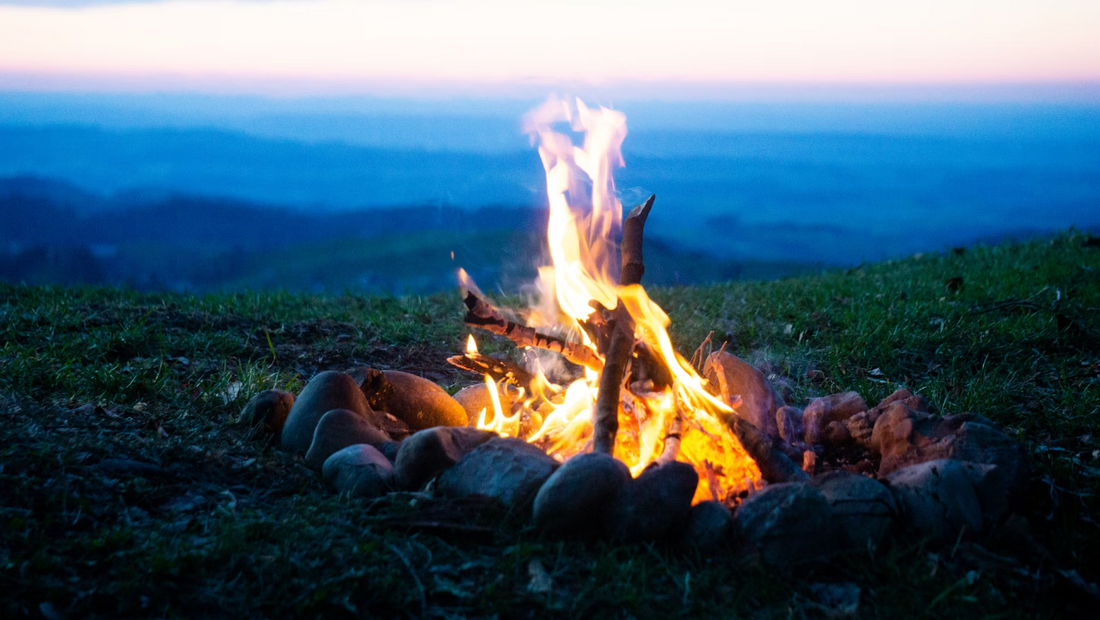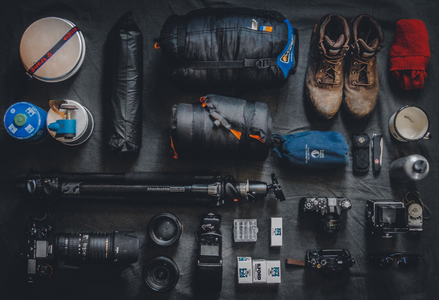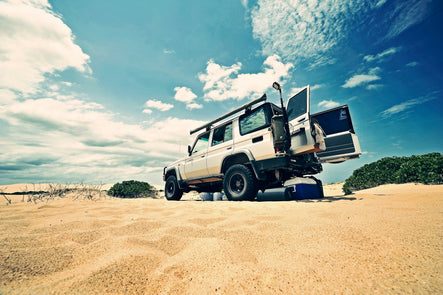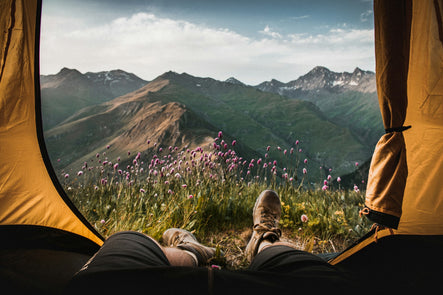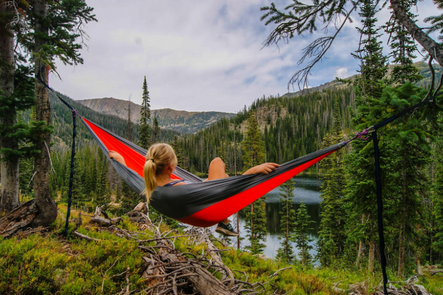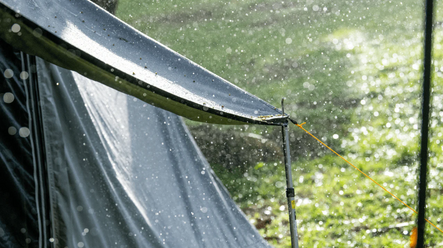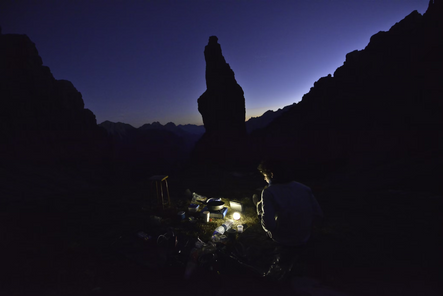Ah, the great outdoors! There's nothing quite like the thrill of setting up camp in nature, gazing at the starry skies, and basking in the warmth of a crackling campfire. But during our wilderness adventures, it's important to remember the responsibility that we hold.
About 10% of all bushfires are caused by campfire negligence. By following campfire rules recommended by the Victorian Government, we play an important role in preserving our national treasures and encouraging the safety of our fellow campers.
In this comprehensive guide, we'll explore responsible campfire practices to equip you with the knowledge to stay safe all year round.
Understanding Campfire Rules
Before we jump into the practical aspects of campfire safety, it's essential to understand that not all camping destinations are the same when it comes to campfires. Different parks, whether national, state, or regional, have varying rules and regulations regarding campfires. That's why the first step to responsible campfire practices is always checking park signs and regulations.
National Parks: Many national parks have designated campfire areas equipped with fire rings or grills. In some cases, fires may be entirely prohibited, particularly in fragile ecosystems or during periods of high fire danger. Always check with park authorities for specific guidelines.
State Forest: State parks often have more relaxed rules regarding campfires compared to national parks. However, fire safety should never be taken lightly. Again, consult the park's official website or contact the ranger station for the latest information.
Campfire Use on Private Land: Even if you're camping on private land, responsible campfire practices are essential. Many of the same safety principles apply. However, it's crucial to be aware of any seasonal prohibited periods that may restrict campfire use, even on private property.
Campfire Rules and Regulations in Victoria
In Victoria, campfire rules are of particular importance due to the state's diverse natural landscapes and varied fire risk conditions. The Conservation Regulator plays a significant role in maintaining campfire safety in Victoria, monitoring compliance with campfire rules and regulations.
Key rules and regulations for campfires in Victoria include:
- Campfires are prohibited on days of Total Fire Ban.
- Campfires are allowed in designated areas with fireplaces, fire rings, or fire pans.
- Only small, clean, and dry sticks, twigs, and leaves can be used as fuel.
- Campfires must be fully extinguished before leaving the site.
- Never leave a campfire unattended.
Consequences of Ignoring Campfire Rules
Irresponsible campfire practices can have severe consequences, both legally and environmentally. Ignoring campfire rules may result in hefty fines or even criminal charges. But the impact extends far beyond the legal realm. Irresponsible campfires can:
-
Cause Wildfires: Uncontrolled campfires are a leading cause of wildfires, which can devastate entire ecosystems and communities.
-
Harm Wildlife: Fires can disrupt wildlife habitats, leading to displacement and even death of animals.
-
Damage Soil Quality: Intense heat from campfires can alter soil composition, making it less fertile.
-
Impact Air Quality: Smoke from uncontrolled campfires can contribute to poor air quality, affecting human health.
How to Build and Maintain a Campfire Safely
1. Building a Campfire
- Proper Construction: In a State Forest, it's essential to use a properly constructed fireplace or dig a trench at least 30cm deep to contain your campfire safely.
- Designated Fireplaces: In National and State parks, campfires may only be ignited in the designated fireplaces provided. Respect these designated areas to preserve the environment.
- Size Limit: Ensure your campfire doesn't exceed 1 square metre in any direction. Maintaining a compact fire minimises its impact on the surroundings and reduces the risk of spreading.
- Branch and Log Length: Logs and branches used for your campfire should be less than 1 metre in length. This standard size facilitates efficient burning and safer management.
- Clearing Flammable Material: Around your trench or fireplace, clear a zone of up to 3 metres in all directions from flammable materials. This precaution creates a buffer zone to prevent fire from spreading uncontrollably.
2. Maintaining a Campfire
- Never Leave Unattended: The cardinal rule is never to leave a campfire unattended. Continuous supervision is crucial to ensuring it remains under control and safe.
- Adult Presence: An adult must always be present while the campfire is alight. This presence provides immediate response in case of any unforeseen circumstances.
3. When You Have Finished with Your Campfire
- Proper Extinguishing: When you've finished using your campfire, extinguish it entirely with water, not soil. Applying water ensures all embers are effectively quenched, preventing any accidental flare-ups.
- Cool Ashes: Before leaving, ensure that the ashes are completely cool to the touch. Cold ashes minimise the risk of re-ignition and safeguard the environment.
Comprehensive Campfire Safety Checklist
Now that you're aware of the importance of checking campfire rules, let's dive into a comprehensive campfire safety checklist. These are the steps you should follow before lighting a campfire:
-
Check Fire Bans: Before heading out, find out if there are any current fire bans in the area. Total Fire Bans can be enforced during periods of extreme fire danger, and lighting a campfire during this time can have severe legal consequences.
-
Select a Suitable Location: If campfires are allowed, choose a location that is at least three metres away from flammable materials like grass, leaves, and overhanging branches. Clear the area of debris.
-
Use a Fire Ring or Fire Pan: If available, use a designated fire ring or fire pan. These are designed to contain the fire safely.
-
Gather Firewood: Collect firewood responsibly. Use only small twigs and branches that can be broken by hand. Never cut live trees or damage vegetation.
-
Create a Firebreak: Surround your campfire area with a firebreak. This can be a cleared area of soil or rocks that acts as a barrier to prevent the fire from spreading.
-
Keep a Fire Extinguisher or Water Nearby: Always have a fire extinguisher, bucket of water, or a hose nearby to control the fire if it starts to get out of hand.
-
Never Leave the Fire Unattended: Don't leave your campfire unattended, even for a moment. Fires can quickly escalate, especially in windy conditions.
-
Keep the Fire Small: Keep the fire to a manageable size. A smaller fire is easier to control and less likely to cause problems.
-
Extinguish the Fire Completely: When you're done with the campfire, pour water on it and stir the ashes until they are cool to the touch. Never bury hot coals.
-
Dispose of Ashes Properly: Dispose of cold ashes in a designated ash disposal container, if available. If not, take them with you and scatter them in an appropriate area away from camp.
More Campfire Tips for a Safe and Enjoyable Visit
Now that you're well-versed in campfire safety, here are some practical tips to make sure your camping trip is both safe and enjoyable:
-
Use a Camp Stove: Consider using a camp stove for cooking instead of a campfire. They are more efficient, produce less smoke, and are often permitted during fire bans. Camping Adventures is home to safe and practical camping accessories in Melbourne, including a wide range of camp stoves.
-
Plan Ahead: Research the campfire rules and regulations for your chosen destination before you go. This will help you pack accordingly.
-
Pack Essentials: Always bring essential fire safety equipment like a fire extinguisher, bucket, shovel, and a first aid kit. Visit Camping Adventures in-store or online to browse essential equipment for safety and camping accessories in Melbourne.
-
Respect Local Wildlife: Keep a safe distance from wildlife and avoid feeding them. Human food can be harmful to animals and may alter their natural behaviour.
-
Leave No Trace: Follow the Leave No Trace principles by packing out everything you bring with you, including trash.
-
Be Fire Smart: If you do light a campfire, choose the right time and place, and follow the safety checklist.
So, the next time you're in the great outdoors, remember: campfire practices are not just rules to follow but a promise to keep our beloved camping spots pristine for generations to come. Stay safe, stay responsible, and most importantly, have fun out there!
Frequently Asked Questions About Campfire Building
Q: Can I have a fire while camping in Victoria?
A: Yes, you can have a campfire in Victoria, but it's essential to follow campfire rules and regulations. Campfires are prohibited on days of Total Fire Ban, and specific guidelines apply to their use in designated areas.
Q: Can you have a fire pit in your backyard in Victoria?
A: Yes, you can have a fire pit in your backyard in Victoria, but it's crucial to adhere to local regulations. Fire safety rules and seasonal restrictions may apply, so it's best to check with your local council for specific guidelines.
Q: What should I do if I spot a campfire that doesn't look quite right?
A: If you encounter an unattended or suspicious campfire, promptly report it to the Department of Environment, Land, Water, and Planning at 136 186 or dial 000 for immediate assistance.
Q: What happens if I breach campfire rules?
A: Violating campfire regulations can lead to on-the-spot fines, with the potential for more severe penalties under the Forest Act 1958 if the case goes to court.
Q: Can I light a fire on the beach in Victoria?
A: In general, it is not permitted to light a fire on Victorian beaches. As always, check with park authorities for specific guidelines.
Shop Fire Safety Gear and Camping Accessories in Melbourne
Our team specialises in camper trailers and camping gear in Melbourne and Hobart. You can check out the Camping Adventures online range for shipping across Australia. You can also come into our camping store for a great range of camper trailer accessories and camping supplies in Melbourne.

